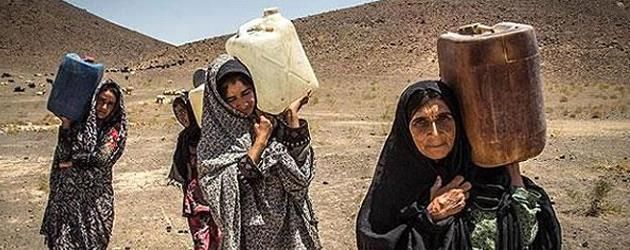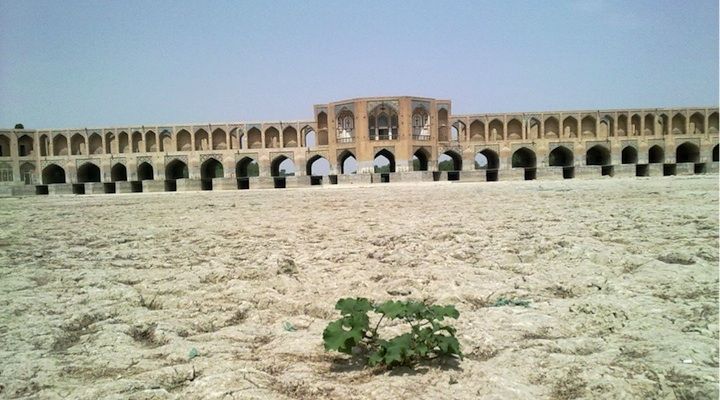Iran's Water Crisis (VIDEO)
Published on by Yoshimi Yoshida, Environmental Consultant in Social
Al Jazeera investigates the race to save Iran's water, before water scarcity dries out entire cities and displaces millions.
 It is hard to imagine life without access to sufficient quantities of fresh water. However, in some parts of the world, particularly the Middle East, that is becoming more than a theoretically disturbing possibility, as climate change, mass migration, environmental degradation, drought and political instability - among other issues - make the use and management of diminishing water resources an increasing challenge.
It is hard to imagine life without access to sufficient quantities of fresh water. However, in some parts of the world, particularly the Middle East, that is becoming more than a theoretically disturbing possibility, as climate change, mass migration, environmental degradation, drought and political instability - among other issues - make the use and management of diminishing water resources an increasing challenge.
It's a particular concern in Iran, where a number of problems - not least the stifling effect of years of international sanctions - mean water depletion is now receiving some serious attention.
As Kaveh Madani, an environmental policy expert at London's Imperial College, explains, there are three main reasons for Iran's rapidly declining water resources, "one being the rapid population growth".
He says: "In less than two decades the population of Iran doubled. The second cause is an inefficient agricultural sector. It's been very important for us over the years of war with Iraq and after that during the sanctions. So it was natural to be really worried about food self-sufficiency and food availability in this country. And the third cause being mismanagement."
"Water is also linked to so many things and unless we understand and appreciate the linkages and this complexity, we cannot solve this crisis," he adds.
 And a crisis is exactly what it is becoming, Madani explains: "Rivers and lakes are going dry one after another, we're losing wetlands, we're seeing land subsidence, we're seeing desertification, which is really sad."
And a crisis is exactly what it is becoming, Madani explains: "Rivers and lakes are going dry one after another, we're losing wetlands, we're seeing land subsidence, we're seeing desertification, which is really sad."
But as Iranians watch their beloved bodies of water disappear, their wells dry up and their farmland turn to dust, there is a growing understanding that in order to avoid any kind of existentialist threat in years to come, the country needs to radically rethink its attitude to water use.
The government has begun to introduce programmes to conserve and manage water more efficiently - particularly in agriculture - while using social media to alert the public to the problem.
Will these measures prove effective? And do they carry any lessons for other countries in this increasingly arid part of the world?
'People & Power' sent reporter Gelareh Darabi and a team from Earthrise , Al Jazeera's environmental series, to investigate the reasons for Iran's water crisis and the innovative schemes now being adopted to resolve it.
Watch video on Iran's Water Crisis
Source : Al Jazeera
Media
Taxonomy
- Water
- Water Scarcity
- Water Cooperation & Conflict
- Scarcity
- Water Scarcity In Desert area
- Water Resources
- Drought
- Desertification
- Water Management
- Water Resources
6 Comments
-
Another article may interest you?
"The attack on the urban area of Aleppo was the latest in a pattern of chemical attacks in Syria carried out by President Bashar al-Assad’s regime in territory held by armed opposition groups in the weeks and months before the partial ceasefire negotiated by the U.S. and Russia, which went into effect on Sept. 12." TIME
http://time.com/4492670/syria-chemical-weapon-aleppo-assad-regime/
-
Desalination plants have come a long way. With the amount of sun available there and the coast you could easily set up solar distillation process and use cold sea water to distill.
-
I suggest you look at the second article on my web site www.ukcaf.org, for a different approach to this terrible strategic attack on the medical and water services in Iran (the title is 'After chemical weapons are used in Syria, now it's biological warfare - by proxy.')
1 Comment reply
-
Good info with thanks.
-
-
make friends with Israel and maybe you can get desalination plants built to solve your water issues
-
How is the matter adressed through experience I have learned educating the people through awareness programs and training process controllers and managing water one can make a huge difference in saving water. No one can live without water there are other ways to look at . If interested drop me a email and we can discus it.hessyolanda0109@gmail.com
-
To resolve the water crisis it has several faces of a polyedro.- Stadistic information and a very coplete of geographic of the country are the base of any study to resolve the problem.- How is used the water? Is it for drinkable and domestic use ? to produce energy? what about the agricultural and industrial use? How many water is flowing in the rivers and is possible to divert some of them??? There are many questions to do with the purpose to prepare the correct way to comply the requirements.- Regards, Luis Morante, Civil Engineer from Lima, Perú